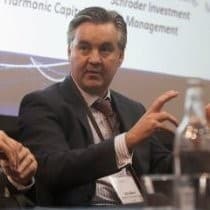
Toby Baker, T. Rowe Price
Toby Baker, head of FX trading at T. Rowe Price, and Ian Packer, senior FX trader at UBS Asset Management, launched the first day of TradeTech FX in Amsterdam with a detailed discussion of the key themes impacting FX traders today – and how they can be addressed.
Looking at how firms can ready their FX desks for heightened volatility, interest rate uncertainty and the rise of electronification, the conversation kicked off with an evaluation of the enormous changes occurring in the market right now.
“So much has changed – this year has been huge,” said Packer. “Covid still rattling on, we’ve seen huge geopolitical risk, high inflation – it’s creating enormous volatility, and this is changing our world this year. Everyone wishes for volatility and then when we get it, we worry about it!”
“So much has changed – this year has been huge.”
“It’s been an amazing year,” added Baker. “Not a great year in terms of performance, but the fact that we’re all even still here is great. Last year, we were talking about what tools we could use to take advantage of potential volatility – and now that volatility has arrived. Liquidity is everyone’s concern right now, and that’s why I’m here – to find out what tools and channels we can use to get access to better liquidity, and to view what liquidity is actually out there.”
Expect the unexpected
A key challenge right now is the continued arrival of the unexpected. For example, in the last couple of days the pound sterling has tanked, and that has caused flash crashes that were not foreseen. “When a major market gets talked about like an emerging market, then we have a problem – and we need to adapt to that,” warned Baker. “I think the worst is yet to come.”
SA-CCR has also been a big issue this year. “It’s hit the US banks harder, but trying to navigate that is still a challenge,” said Packer. “Who’s got the balance sheet, who can take it?”
As SA-CCR amendments roll in, some banks are getting even tighter on pricing. “There are different options but ultimately, all of them still rely on some form of credit,” said Packer. “There are various routes for banks to put it on their balance sheet, so you just have to work together to see how you can work that out.”
Liquidity is key
Relationships are now central – whether with banks, providers, or venues – and they are increasingly crucial to being able to source liquidity.
“Peer to peer can also help with liquidity issues,” suggested Baker. “When it comes to trading venues, you just have to kick the tyres and see who can help you. We’re in an environment now where people have to be proactive – you can’t just sit back and wait for people to help you.
“We’re in an environment now where people have to be proactive – you can’t just sit back and wait for people to help you.”
“We all need to understand liquidity: how much liquidity is available in each market, and how much we can do without leaving a footprint. We all want a fair price for a fair trade – if you can beat a spread great, and we all want to outperform – but we also need to be a bit careful about how much we’re putting through the pipes.”
Automation efficiencies
Automation is of course another ongoing trend, and according to the keynote speakers, it’s gaining momentum.
“We automate about 50% of our tickets,” revealed Baker. “Mainly the small tickets that don’t add a great deal of value. We rely on TCA to spot the outliers – about 95% goes through, and traders get alerted on the dashboard when there’s an issue. That works really well. Predominantly it’s the time value – all of us need more time, and automation helps make us more efficient. No one wants to automate themselves out of a job, but I don’t think that’s going to happen. Will we be trading a yard of something automatically? Probably not – automation just helps clear the smaller tickets off the dashboard, allowing the traders to focus on the larger stuff.”
No one wants to automate themselves out of a job, but I don’t think that’s going to happen.
But be warned – just because the markets are going one way right now, doesn’t mean traders shouldn’t be preparing for yet another reversal.
“There will come a point where interest rates may turn, when central banks double back, especially if we go into recession. What happens to risk in that environment? You’d imagine it would do very well, but we’ll have to wait and see,” said Baker.
Future outlook
FX futures have a role to play, and are likely to have a bigger role in the future. However, Packer warned that: “I’ve found them too inflexible in the past – in terms of sizes, and pairs available. I’m not saying never, but when I’ve looked at them in the past, they don’t really fit.”
And crypto is also on the radar – although perhaps not in the most immediate of terms. “We’ve hired someone who specialises in digital assets,” revealed Baker. “Are we trading in crypto yet? No, but I hope we will have the ability, should clients want to trade it in the future.”
Packer agreed: “We’ve looked at crypto, in case we get client demand, but we haven’t seen much yet.”
In the uncertain future, however, there is one thing the panel agreed on.
“Budgets are going to get cut everywhere, including for tech spend,” warned Baker. “There are things you might want to look at, but you have to be aware of costs. Kick the tyres, but be aware of what tyres you’re kicking.”